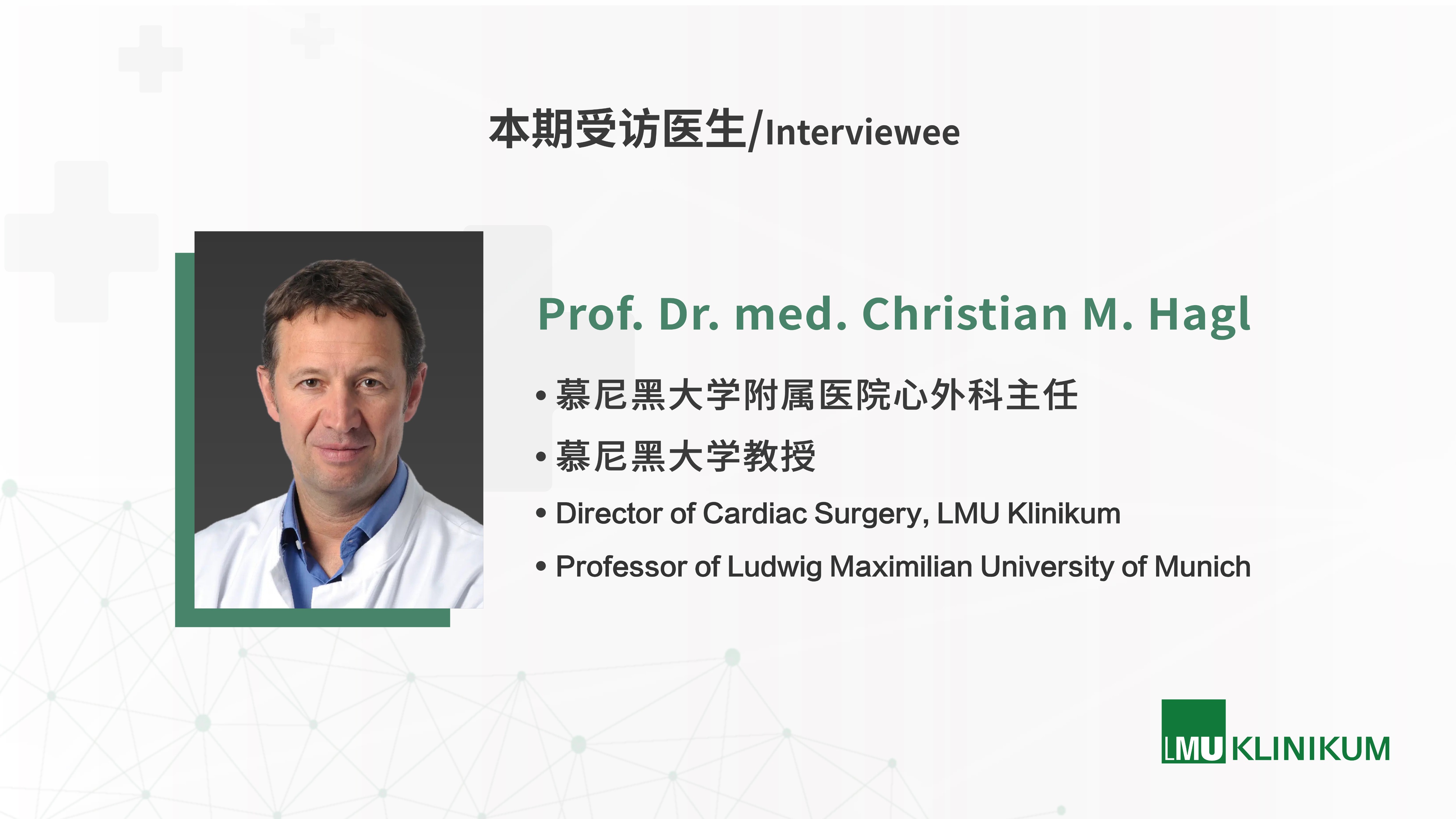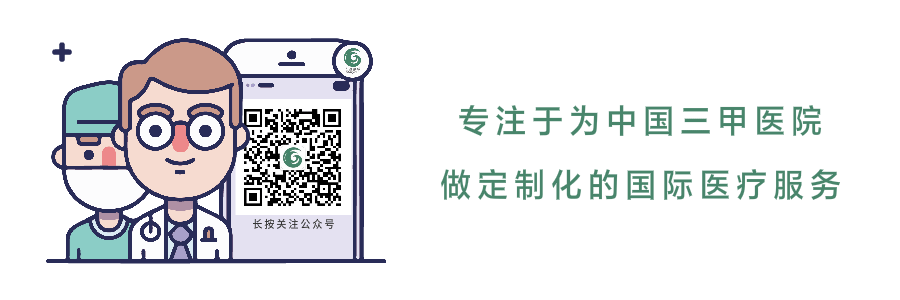-
News & Events


At 2:00 p.m. on June 13th, the team of four from Gloryren headed to the Grosshadern Campus of the University Hospital of Munich to visit Prof. Hagl, the Director of the Cardiac Surgery Clinic and Polyclinic, and had an interview of him as a special closing episode of The World's Great Doctors of 2024.In 2011, Prof. Hagl was appointed as the Director of the Cardiac Surgery Clinic and Polyclinic of the University Hospital of Munich, which is one of the largest cardiac surgery centers and heart transplant centers in Germany. The Cardiac Surgery Clinic and Polyclinic has 155 employees and performs 3,000 surgeries per year. In 2023, about 1,500 interventions with heart-lung machine, more than 200 VA ECMO implantation, and 100 heart and lung transplants were performed. The Clinic reached several milestones as the first in the field of heart transplantation: The first heart transplantation, the first heart-lung transplantation, and the first heart-lung-liver transplantation in Germany were all performed there. Patients who received heart transplants in the Clinic have a survival rate of 80% in the first year after surgery, and 70% in 10 years. The laboratory of the Clinic is one of the first worldwide to start the pig heart xenotransplantation experiment, and published a report on Nature Journal in 2018.Prof. Hagl's father is one of the best known cardiac surgery masters in Germany and even Europe. He is the former Director of the Surgery Department of Heidelberg University Hospital, and the former President of the European Association of Cardio-Thoracic Surgery (EACTS) and the German Society for Thoracic, Cardiovascular Surgery (DGTHG).In the interview, Prof. Hagl shared with us his father's influence on his career, his plans for cultivating young surgeons, and the plan for his department's development in the next 10 years.
1. Why did you decide to pursue a career in medicine and why, in particular, did you decide to specialize in Cardiac Surgery?
I started very early when I was very young. I was always very interested in the human body. I loved physiology. I loved the movement of the body and I also was very interested in the social aspects. These all, together with the idea to work with my hands, led to the decision to go to medical school first and finally into cardiac surgery which gives you the chance to work with your hands to work in emergency situations and to really help very sick patients.
2. Your father is a well-known cardiac surgeon, who is the former president of the European Association for Cardio-Thoracic Surgery and of the German Society for Thoracic and Cardiovascular Surgery. How does he influence your career?
Yeah, true. He was a really good Chairman in Heidelberg and very famous actually. He was a role model. On the other hand, he always told me to do something which I really wanna do independent of medicine. But what impressed me a lot was that when he came home, he was always very happy with his profession. He always told me that he is very satisfied with what he has done during the day. Then I went to the hospital several times and I was again very impressed. At that I started with the idea to go to medical school.
3. Based on your experience, how important is it for a medical doctor to visit different hospitals or different countries?
I think it's very important. I, myself, spent two and a half years in New York and it gives me the chance of doing a lot of research, to look at the completely other perspective compared to what I have learned in Germany. It opens your mind and I think this is very important. You have get other social contacts and you can build up a network. It's good for for your mind, but it's also good for everything which has to do with your profession.
4. What has been your biggest challenge since taking over the Department of Cardiac Surgery at the LMU Klinikum in 2011? Could you please share with us your plan on this position for the coming decade?
There are quite a number of challenges, actually. I would say, what is really a challenge every day is the administrative work. It's not really doing the operation because this is a lot of fun and this is my really profession. The administration and the political situation in Germany in medicine is currently a real problem. We have a lack of of nurses. We are looking for some infrastructural problems. This is facing you every day. This is more problematic and more challenging than everything which has to do with medicine overall.
Yeah, there are a number of plans. I will still try to do the best what I can do in treating our patients. We definitely wanna improve our transplant and aortic surgery program. We want to be the first ones in Germany to do xenotransplantation. As you know, Prof.Reichart invented the program here in an animal lab. Now what we wanna do is to transfer the whole thing into the clinic. And the other thing what I would like to do is give young people the chance to learn really cardiac surgery from scratch on and to get involved in clinical but also in experimental training.
5. Have you ever had the darkest moment of your life? And how did you overcome it?
And sometimes dark moments in the life of a cardiac surgeon are depending on what you are doing in the OR. And if you are losing a patient unexpectedly, it can be very hard. And it causes sometimes some nights where you can't sleep. And these you have to overcome these dark moments. And it helps that in most cases you are successful. But as I said, the mindset in this situation is a very important aspect.
6. How do you balance the personal life, administration, clinical practice, research activities and lecturing?
It's not that easy to bring these things all together and to satisfy everybody and everything. I think, as I said before, the mindset is very important and you have to be very well organized. And you need a good team to help you to bring all these things together. And here in Munich, I have a number of assistants working with me. So, you have to tell them what to do, but you have to also give them the chance to work by themselves. And you can always only be a good chief, in my opinion, if you are stable. And for me, sports, for example, is something which is very important. My family is very important for me also. And I love to come to work. And this is probably the most important aspect in this context.
7. You have been an active member of many leading organizations or societies in the field of cardiac surgery. How important do you think these societies are to the field of cardiac surgery and to the cardiac surgeons?
I think it's very important to have these communities, these societies. And as you know, we have a society in Germany, one in Europe, and also a number in the US, also in Asia. No question, and the interaction is very important for us. The political aspects are important, especially for surgeons, also in the interactions between surgeons and cardiologists. But also, when we talk about political issues, especially in Germany, as we talk about working hours, restrictions, new rules, and the whole medical system, well I think it’s a lot, it will be a lot to do in the future. And this is not possible to do that as one single person. But you need a number of people who are very well organized. And society is the best way to do that.
8. The annual congress of the national society was held under the motto “Mission Future” this year. What’s your interpretation of this motto?
There this interpretation on Mission future. It's not that easy because, as you know, the cardiologists are very active and they do a lot. And the numbers in cardiac surgery went down over the last years. So the future for the surgeons will be a little different. And there is a controversial discussion in our society: if we should also try to do, not only classical surgical operations, but also train our wire skills and do something what most of the cardiologists are doing. In my opinion, it's very important to train people who are really, really good surgeons. This is something which we have to achieve for the future. And for the next decade, it will not be very easy, because we need young people. And what we realize in Germany that we have a problem to convince people to go to cardiac surgery, since it is a very painful sometimes, I would say, education, which takes eight to ten years to become a good surgeon.
9. A good doctor may benefit the patients in their times, but a good educator in medicine may benefit patients of the future. How do you support the next generation in your department?
Yeah, what we do is we have real training for them. So they will be trained in the OR. They have also theoretical things to learn. We send most of them in our labs, to do some experimental work, to get some ideas how to work with, to answer questions coming from the clinic, and transfer the results back into the clinic from the lab, which means something like translational medicine. And this is what we try to do. And we also try to build a community of people who like to work with each other, and who really want to be good doctors. And this is something we train them every day, showing how to do that and trying to be a good role model.
10. What is your proudest career achievement to date and why?
I think my proudest achievement is my team. I think there's no question about that. I have very, very good people here, good questions we have. We are a very strong community and I feel very satisfied with all my colleagues. And it took a while when I came to Munich it was twelve. Now, almost thirteen years ago it was not that easy. But now we have built a team of 36 doctors working together, every day being not all friends, but they are close to that.
11. What’s the most fascinating part of your profession as a medical doctor? And what would you have been if you had not been a medical doctor?
The most fascinating aspect is, for me, is still the operation. I really love surgery, working with my hands, and the feeling when you have finished an operation, and you see that you were able to help a patient, and this is really satisfaction for me. If I wouldn't be a doctor or physician, I probably would have been a carpenter. So something which is pretty close to a surgeon actually. You need your hands and you have to build something, and carpenters and surgeons are pretty close, like handymen also.
12. What are your hobbies outside medicine?
I would say sports, sports and sports. This is what I really love to do. I like biking, especially mountain biking. I go hiking, running. I love to ski in the winter, do some touring. So most of the time I'm very active when I'm not in the hospital. I actually also like to eat good food, and drink also good wines. And I would say these are my primary hobbies, and I guess I have to say, my wife is also my hobby.
